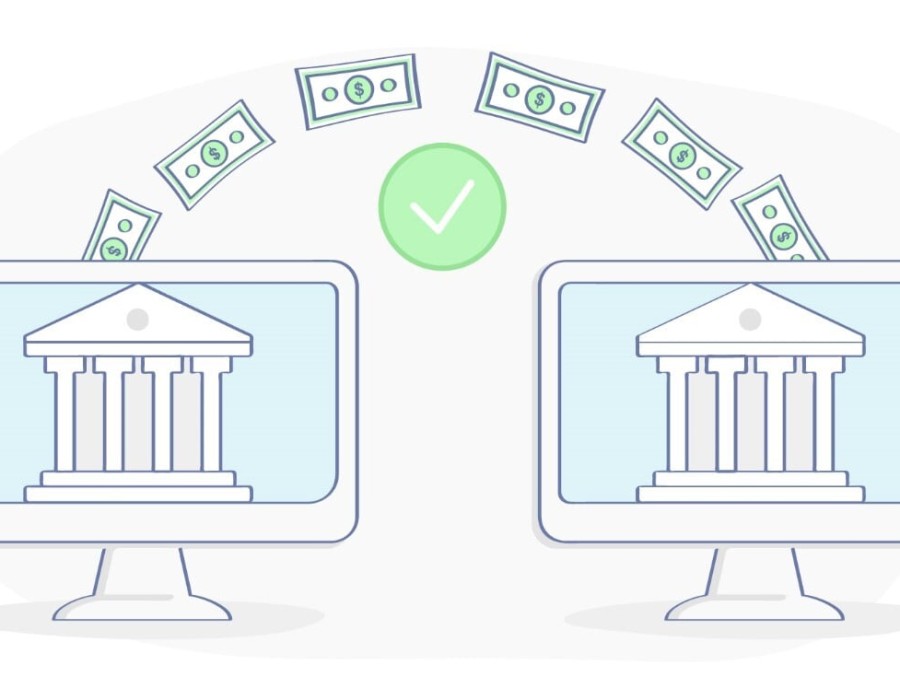The process of money transfer has been speeding up with the increasing speed and convenience offered to the end user. One could very well pay a bill, send money for want of some service rendered to the family abroad, so to speak, or settle an invoice: bank transfers remain amongst the safest and most reliable methods of doing so.
Although the process seems simple, it is also important to learn how bank transfers unfold, what types exist, and what safety measures need to be followed so that the money reaches its rightful destination securely and on time.
What Is a Bank Transfer?
A bank transfer, normally referred to as a wire transfer, is the procedure of moving certain amounts of money from one bank account to another. Bank transfers can be in the same bank (same bank transfer) or from another bank (inter-bank transfer): the latter types can be on a national or international level.
In a transfer initiation, the bank debits the money from your account and electronically transfers the same to the recipient's bank, which then credits the amount to their account. Such transfers are usually made through secure banking networks, rendering them a trusted way of sending funds.
Various modes of Bank Transfers
Before learning the right way on how to transfer money safely, here are some useful tips to take into account:
Domestic Transfers
Money transfer from one person's account into another person's account within the borders of the country is deemed a domestic transfer. By and large, these transfers involve local payment systems and are completed quickly, whether that means in minutes or up to hours.
International Transfers
They are wire transfers wherein one money transfer is from a bank account in one country to a bank account in another country. They are majorly time-consuming (1-5 business days) and charge currency conversion fees to the concerned parties.
Real-Time Payments
New-age banking systems also enable instant transfers wherein the funds reach the receiver within a matter of seconds, even if the transaction occurs after hours!
Scheduled or Recurring Transfers
As the name suggests, these are transfers made on an agreed date, with other processes, say, monthly rental payments or advancing loan payments.
So, it’s important to understand which transfer type you are to complete.
How to Make a Bank Transfer Online
Transferring funds from one party to another through a bank is one of the easiest methods of sending money. Usually, banks provide mobile apps where the transaction is easier to complete than ever.
- Enter your mobile banking.
- Then look for alternate routes through "Transfers" or "Payments."
- Specify the kind of transfer: one domestic or international.
- Entry of exact data of the recipients, i.e., name, account number, and bank codes such as IBAN, SWIFT, or Routing.
- Enter the amount to be sent and choose the currency.
- For verification, one reviews the details and approves the transaction by means of a One-Time Password (OTP) or biometric verification.
- Save or screenshot the confirmation receipt as proof.
In many cases, the customers would be able to set future dates for the transfers and recurring payments, which assist in handling regular bills efficiently.
Check the Recipient's Data with Maximum Attention
Any error on the entered account number will thus allow money to be transferred into another individual's account or simply not cause a transaction to be executed. Hence, always check before confirming if the correct name, number, or bank code has been supplied.
Use Only a Secure Internet Connection
For online money transfers, use a personal, encrypted Wi-Fi network. Never use public Wi-Fi for these sensitive matters, because a hacker might very well intercept your data.
Two-Factor Authentication
It adds a secondary level of protection such that even if your password is compromised, no one else will be able to log into your account without a time-sensitive code.
Keep a close eye on your bank statement
Regularly checking on your transactions makes it easier to detect any abnormal activities, or rather unauthorized transactions. It is better to report suspicious transfers to your banker immediately.
Beware of Scams and Phishing
Never should you send money to strangers or unverified people. Be very cautious about emails or texts asking you to confirm your bank details. Under no circumstances would a genuine bank do so through an unsecured channel.
These steps are to help you stay away from fraudsters and protect your means.
Fees and Processing Times
Each bank and type of transfer will yield different fees and processing times. On the domestic level, transfers are often less charged or free, but international transfers usually attract higher fees due to the presence of intermediary banks and currency conversion fees.
You would want to check on the following:
- A fee for transfer, if any (flat or percentage-based)
- Exchange rates are applicable to foreign currency transfers.
- Cutting-off times for confirming same-day processing:
With this, you'll be able to rank which options are the fastest and thus the cheapest for you.
Bank transfers represent the bedrock of today's financial transactions, always fast, dependable under all circumstances, and secure if carried out correctly.





Comments